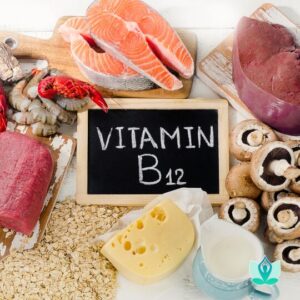Anxiety and stress aren’t just mental challenges—they affect your entire body. While therapy and mindfulness practices are essential, certain vitamins can help reduce symptoms and support overall mental health.
In this guide, we’ll explore the 8 best vitamins and nutrients for anxiety and stress, showing how they work and how to incorporate them into your diet for a more balanced, healthier life.
How Can Vitamins Help with Anxiety and Stress?
Vitamins play a crucial role in brain function, neurotransmitter regulation, and hormone balance—all of which are directly linked to mental well-being. Incorporating these nutrients into your diet can alleviate anxiety, improve mood, and help your body cope with stress.
Let’s dive into the top vitamins for anxiety and stress relief.
8. Vitamin E: Can Vitamin E Reduce Anxiety?
Vitamin E is a powerful antioxidant that protects brain cells from oxidative stress, a common factor in mood disorders.
Tip: Consult a healthcare provider before supplementing, as excessive doses may interact with medications.
Why It Helps:
Neutralizes harmful free radicals that affect brain function.
Supports neuronal health and mitigates damage linked to anxiety and depression.
Evidence: A study in the Journal of Affective Disorders found that Vitamin E significantly alleviated symptoms of anxiety and depression.
Sources: Nuts, seeds, spinach, broccoli.

Vitamin E, a potent antioxidant that’s essential for more than just maintaining skin and heart health; it plays a significant role in mental health as well.
This vitamin is renowned for its ability to neutralize free radicals—harmful molecules that can damage cells, including those in the brain.
By fighting oxidative stress, Vitamin E helps protect the brain and mitigate the damage that can lead to mood disorders.
Oxidative stress has been linked to various mental health issues, including anxiety and depression. When the body is unable to effectively neutralize free radicals, it can lead to an imbalance that affects the brain’s function and health.
Vitamin E contributes to the protection of delicate neuronal structures by reinforcing the body’s antioxidant defenses, thus supporting overall mental well-being.
The impact of Vitamin E on mood disorders has been substantiated by research, including a notable study published in the Journal of Affective Disorders.
This study found that high doses of Vitamin E significantly alleviated symptoms of mild to moderate depression and anxiety.
The antioxidant properties of Vitamin E helped reduce the oxidative stress in the brain, which is often heightened in individuals experiencing these conditions.
Incorporating Vitamin E into your diet can be easily achieved through foods such as nuts, seeds, spinach, and broccoli, which are not only rich in Vitamin E but also offer a host of other health benefits.
For those considering Vitamin E supplementation, it’s important to consult with a healthcare provider, as high doses of Vitamin E can interact with certain medications and conditions.
7. Vitamin B1 (Thiamine): How Does Thiamine Support Mental Health?
Thiamine is essential for energy metabolism and nervous system function, making it a key nutrient for mental clarity.
Bonus: Helps convert food into energy, ensuring your brain has the fuel it needs to function optimally.
Why It Helps:
Supports neurotransmitter production, promoting mood stability.
Deficiency can lead to irritability, confusion, and depression.
Sources: Whole grains, pork, nuts, legumes.

This essential nutrient is a powerhouse when it comes to energy metabolism and nerve function.
Thiamine plays a crucial role in converting carbohydrates into energy, ensuring that your body and brain have the fuel they need to function optimally.
It’s particularly important for the proper functioning of the nervous system, aiding in the transmission of nerve signals throughout the body and brain.
Thiamine deficiency can have a profound impact on mental health.
Because of its fundamental role in nerve function, a lack of Thiamine can disrupt neurotransmitter regulation, leading to mood disturbances.
Symptoms of Thiamine deficiency include confusion, irritability, and depression, which are often exacerbated by stress.
This makes maintaining adequate levels of Thiamine vital, especially during periods of high mental demand or stress.
The brain relies on this vitamin to help produce neurotransmitters that regulate mood, such as acetylcholine, which is linked to mood stabilization and the enhancement of memory and focus.
To boost your Thiamine levels, consider incorporating more Thiamine-rich foods into your diet.
Whole grains, meat (especially pork), nuts, and legumes are excellent sources.
6. Magnesium: Why Is Magnesium Called the ‘Relaxation Mineral’?
Magnesium plays a pivotal role in calming the nervous system and regulating stress hormones.
Tip: Magnesium supplements or Epsom salt baths can provide additional relaxation benefits.
Why It Helps:
Controls cortisol levels to prevent prolonged stress responses.
Regulates GABA receptors, promoting relaxation and better sleep.
Evidence: Studies, including one in the Journal of the American Board of Family Medicine, show magnesium supplementation reduces anxiety symptoms.
Sources: Leafy greens, nuts, seeds, whole grains.

Magnesium, a mineral that’s crucial for over 300 biochemical reactions in the body and is fondly referred to as the ‘relaxation mineral.’
Magnesium’s calming properties are especially beneficial for the nervous system, making it a key ally in managing stress and anxiety.
Magnesium plays a pivotal role in regulating the body’s stress-response system.
It helps control the release of stress hormones like cortisol, ensuring they don’t spiral out of control and lead to prolonged stress.
By modulating these stress hormones, magnesium aids in maintaining a state of calm and prevents the overactivation of the nervous system, which can contribute to anxiety and other mood disorders.
Moreover, magnesium has a direct effect on the nervous system’s ability to relax.
It helps regulate neurotransmitters, which are chemical messengers in the brain that send signals throughout the nervous system.
By aiding in the function of GABA receptors, which are responsible for promoting relaxation and sleep, magnesium can alleviate symptoms of anxiety and irritability, and also improve sleep quality.
A notable study published in the Journal of the American Board of Family Medicine found that magnesium supplementation could significantly reduce symptoms of anxiety, demonstrating its potential as a therapeutic option for those suffering from stress-related disorders.
Incorporating magnesium into your diet can be done through foods rich in this mineral, such as leafy green vegetables, nuts, seeds, and whole grains.
5. Vitamin B6: Can Vitamin B6 Improve Your Mood?
Vitamin B6 is critical for producing neurotransmitters like serotonin and dopamine, which regulate mood and emotional well-being.
Bonus: Supports better sleep by boosting melatonin production.
Why It Helps:
Converts tryptophan into serotonin, the “feel-good” neurotransmitter.
Helps manage mood swings and stress responses.
Sources: Turkey, bananas, chickpeas, fortified cereals.

Vitamin B6, a crucial nutrient that plays a vital role in mental health by influencing neurotransmitter synthesis.
This vitamin is integral in the creation of neurotransmitters such as serotonin and dopamine, which are key regulators of mood and emotional well-being.
Serotonin, often referred to as the “feel-good” neurotransmitter, is essential for mood stabilization, while dopamine is linked to motivation, pleasure, and reward.
Vitamin B6 is crucial because it aids in the conversion of the amino acid tryptophan into serotonin and also helps in the synthesis of dopamine.
By ensuring the proper functioning of these neurotransmitters, Vitamin B6 can help regulate emotions and prevent mood swings.
To ensure adequate intake of Vitamin B6, consider incorporating foods rich in this nutrient into your diet.
Good sources include turkey, chickpeas, bananas, and fortified breakfast cereals.
These foods not only contribute to fulfilling your daily nutritional needs but also support your neurological and psychological health.
4. Vitamin B12: Is Vitamin B12 Effective for Anxiety?
Vitamin B12 supports serotonin production and protects against mood imbalances caused by deficiency.
Tip: Vegetarians and vegans may need B12 supplements to meet daily requirements.
Why It Helps:
Regulates serotonin levels, reducing the risk of depression and anxiety.
Essential for energy production and cognitive function.
Sources: Meat, dairy, eggs, fortified cereals.

Vitamin B12, an essential nutrient that plays a crucial role in maintaining psychological health and emotional balance.
Vitamin B12 is integral for the production of serotonin, a key neurotransmitter often dubbed the “feel-good” chemical due to its significant impact on mood regulation and overall mental well-being.
Serotonin helps regulate mood, sleep, and appetite, all of which can be adversely affected by a B12 deficiency.
Insufficient levels of Vitamin B12 can disrupt the synthesis of serotonin, potentially leading to mood imbalances, increased stress, and even clinical conditions such as depression and anxiety.
This is particularly concerning because Vitamin B12 deficiency is relatively common, especially among older adults, vegetarians, and people with absorption issues.
To maintain adequate levels of Vitamin B12 and support mental health, it’s important to include B12-rich foods in your diet, such as meats, dairy products, eggs, and fortified cereals.
For vegetarians and vegans, who might find it difficult to obtain enough B12 from diet alone, B12 supplements can be an effective way to ensure they meet their nutritional needs.
3. Vitamin D: How Does Vitamin D Impact Mental Health?
Known as the “sunshine vitamin,” Vitamin D plays a key role in brain health and mood regulation.
Tip: Consider supplements if you live in low-sunlight regions or have limited outdoor exposure.
Why It Helps:
Influences neurotransmitter synthesis and reduces inflammation in the brain.
Low levels are linked to increased risk of anxiety and depression.
Evidence: Meta-analyses show Vitamin D supplementation improves mood and reduces anxiety symptoms.
Sources: Sunlight, fatty fish (salmon, mackerel), fortified dairy, egg yolks.

Vitamin D, often celebrated as the ‘sunshine vitamin’ due to its production in the skin through sunlight exposure.
Vitamin D is crucial not only for bone health but also for optimal brain function and emotional well-being.
Vitamin D receptors are widely present in the brain, suggesting a significant role for Vitamin D in maintaining mental health.
It influences the synthesis of neurotransmitters and nerve growth, and studies have found that low levels of Vitamin D are often linked with an increased risk of mood disorders such as depression and anxiety.
This connection is particularly notable in regions with long winters or in individuals who spend considerable time indoors, leading to insufficient sunlight exposure and consequently lower Vitamin D levels.
A systematic review and meta-analysis, consolidating results from multiple studies, have confirmed the beneficial effects of Vitamin D supplementation on mood regulation.
This research has demonstrated that supplementing with Vitamin D can significantly improve symptoms in individuals experiencing anxiety and depression, especially those found to have low levels of this vitamin.
Given its profound impact on mood and mental health, it’s important to maintain adequate Vitamin D levels.
While sunlight exposure is the most natural way to produce Vitamin D, factors like geographic location, skin pigmentation, and lifestyle can limit exposure, making dietary sources and supplements important.
Foods rich in Vitamin D include fatty fish like salmon and mackerel, fortified dairy products, and egg yolks.
But for many, Vitamin D supplements can be an effective method to ensure optimal levels, particularly during the darker months of the year.
2. Omega-3 Fatty Acids: Can Omega-3s Help with Stress and Anxiety?
Omega-3 fatty acids are vital for brain health, reducing inflammation, and improving mood.
Tip: Algal oil supplements are a great plant-based option for omega-3s.
Why It Helps:
EPA and DHA influence neurotransmitters and brain signals linked to mood regulation.
EPA, in particular, has been shown to reduce symptoms of anxiety.
Evidence: A study in the American Journal of Psychiatry found EPA supplementation effective in alleviating anxiety.
Sources: Fatty fish (salmon, sardines), flaxseeds, chia seeds, walnuts.

Though not vitamins, these essential fats are fundamental to brain health and function, making them indispensable for maintaining mental well-being.
Omega-3s are crucial components of the brain’s structure, influencing its operations and playing a significant role in cognitive and emotional health.
Omega-3 fatty acids, particularly EPA (eicosapentaenoic acid) and DHA (docosahexaenoic acid), are known for their anti-inflammatory properties, which are vital for preventing and mitigating inflammation within the brain that can lead to mood disorders.
EPA, in particular, has been highlighted in numerous studies for its effectiveness in reducing the symptoms of anxiety.
This fatty acid helps regulate neurotransmitter functions and brain signals that influence mood and stress responses.
A study published in the American Journal of Psychiatry found that supplementation with EPA significantly alleviated anxiety symptoms.
These findings support the notion that omega-3 fatty acids can have a therapeutic effect on mood disorders, making them a key dietary component for anyone looking to enhance their mental health.
The best sources of omega-3 fatty acids are fatty fish such as salmon, mackerel, and sardines.
For those who do not consume fish, alternatives like flaxseeds, chia seeds, and walnuts, along with omega-3 supplements (especially those derived from algae), can help maintain adequate levels.
1. Vitamin C: Why Is Vitamin C a Top Nutrient for Stress Relief?
Vitamin C, known for its immune-boosting properties, also plays a crucial role in managing anxiety and stress.
Tip: Add fresh citrus to your meals or enjoy a glass of orange juice for a quick Vitamin C boost.
Why It Helps:
Reduces cortisol, the “stress hormone,” and calms the nervous system.
Acts as an antioxidant to protect brain cells from oxidative damage.
Evidence: Research in Psychopharmacology showed Vitamin C supplementation significantly reduced anxiety in high-stress individuals.
Sources: Oranges, strawberries, bell peppers, kiwifruit, broccoli.

Vitamin C, a powerhouse nutrient well-known for more than just its immune-boosting properties.
This essential vitamin also plays a critical role in managing psychological health, particularly in reducing stress and anxiety.
As a potent antioxidant, Vitamin C helps neutralize free radicals and prevents oxidative stress, which can adversely affect brain health and mood.
Vitamin C’s ability to reduce anxiety is partly due to its effect on cortisol, commonly known as the “stress hormone.”
High levels of cortisol are often associated with elevated stress, and Vitamin C has been shown to help regulate cortisol levels, thus helping to reduce the body’s overall stress response.
By moderating cortisol, Vitamin C helps to calm the nervous system, reduce anxiety, and promote a more stable mood.
This impact of Vitamin C on stress and anxiety was illustrated in a notable study published in the journal Psychopharmacology.
The research found that daily supplementation with Vitamin C significantly reduced anxiety levels among high school students, underscoring its potential as a natural and effective remedy for stress reduction.
Incorporating Vitamin C into your daily routine can be done effortlessly through dietary sources such as oranges, strawberries, bell peppers, kiwifruit, and broccoli.
How to Incorporate These Vitamins into Your Routine
- Balanced Diet: Focus on whole, nutrient-dense foods rich in these vitamins.
- Supplements: If dietary sources are insufficient, consider high-quality supplements after consulting a healthcare provider.
- Lifestyle Practices: Combine good nutrition with regular exercise, adequate sleep, and mindfulness techniques for holistic mental health management.
Vitamins for Anxiety and Stress Relief
These 8 essential vitamins and nutrients—Vitamin E, B1, Magnesium, B6, B12, Vitamin D, Omega-3s, and Vitamin C—play a vital role in managing anxiety and stress. By supporting brain function, neurotransmitter production, and hormonal balance, they can help improve mood and reduce the impact of daily stressors.
What’s Your Go-To Remedy for Managing Stress?
Have you tried any of these vitamins or other natural remedies for anxiety and stress? Share your tips in the comments below—we’d love to hear your experiences!
Stay healthy and take care!